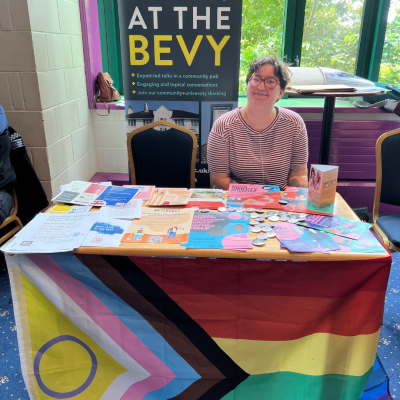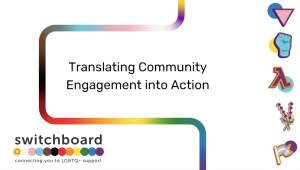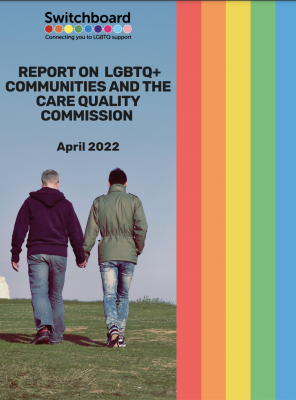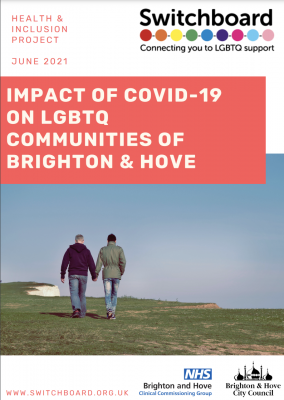Health & Inclusion Project
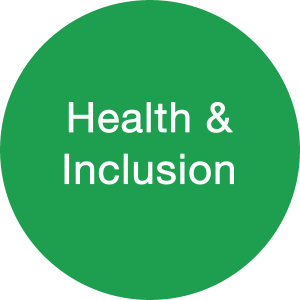
Our Health & Inclusion Project (HIP) promotes LGBTQ health and wellbeing by amplifying the voices of communities, working in partnership, and providing training. We inform and influence others including healthcare, council services and other charities, sharing what we know and highlighting needs and inequalities that exist for LGBTQ communities and individuals.
You Said We Did…
Following consultation with communities, we have prioritised safe, inclusive housing for LGBTQ people. We have been action-focused, organising a community-led LGBTQ housing summit, which led to our LGBTQ Housing Manifesto and a successful bid for an LGBTQ Night Shelter Pilot. You can find details here:
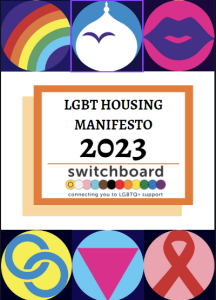 Housing Manifesto
Housing Manifesto
Translating Community Engagement into Action (Housing)
Research & Engagement
Increasing Diversity in Health Research
Switchboard has been part of working in partnership with the NHS, Universities, and other Voluntary Sector organisations as part of the Sussex Research Engagement Network (REN). Research helps us to challenge health inequalities often faced by minoritised groups and influence change.
With a local focus on LGBTQ+ people, Global Majority communities local VCSE partners recruited fifteen community researchers who are members of these communities.
They asked questions about:
- Experiences and perceptions of the NHS
- Accessing health and care information
- Awareness and understanding of NHS Health and Social Care Research
- Views on participation in research
Read the project findings here:
Sussex Research Engagement Network Community Researcher Project Findings July-2024
You can see the video of community researchers discussing the importance of community research here:
Report on LGBTQ+ Communities and the Care Quality Commission – April 2022
Switchboard was commissioned by Healthwatch Brighton and Hove to engage LGBTQ+ communities in Brighton and Hove and explore their experiences of using health and social care services. We also asked them how existing feedback systems could be improved and what prevents them from feeding back about health and social care to the Care Quality Commission (CQC). We held focus groups and 1-1 interviews and have published a report which you can find here.
The barriers identified included:
- Lack of knowledge of what the Care Quality Commission is and what it does: “People don’t feel comfortable feeding back to something they don’t know”
- The emotional burden of feedback particularly after a negative experience: “When you have a bad experience you are demoralised”
- Fear of CQC not understanding LGBTQ+ issues and experience of health inequalities LGBTQ+ people face
- Fear of negative impact on health and social care provision
- Concern for health and social care providers
People made suggestions for improvements “I would feel empowered if there was an advocate with lived experience or someone who can listen and signpost and support in managing the ‘system’”
The full Healthwatch report with recommendations can be found here.
Since receiving the feedback from Brighton and Hove Healthwatch and Switchboard the Care Quality Commission has responded with the following actions:
Healthwatch Switchboard LGBTQ+ feedback project update
The impact of Covid-19 on LGBTQ communities of Brighton and Hove – June 2021
Switchboard was commissioned by Brighton & Hove City Council and Brighton and Hove Clinical Commissioning Group (CCG) to explore the impact of the pandemic on LGBTQ communities to inform and influence priorities in the ‘recovery period’.
The report shows that Covid-19 has exacerbated existing health inequalities across issues such as mental health, trans health and housing, as well as the lack of LGBTQ-affirming support. They found the most marginalised LGBTQ people have struggled the most. This includes young people, people of colour and trans and/or non-binary people.
The results are taken from a survey with 595 responses covering areas such as mental health, housing, sexual health and uptake of vaccinations. This was followed by focus groups exploring issues more in-depth. From this they found:
- 74% of respondents felt depressed, with 68% of 18-24 year olds and 41% of people of colour considering suicide
- 60% of those under 24 and 40% of trans and/or non-binary people were living in an unsafe living situation
- 68% of LGBTQ people felt lonely or isolated
Respondents called for:
- Increased access to timely LGBTQ affirmative mental health support
- Access to safe housing for those in insecure living situations experiencing homo/bi/transphobia and domestic abuse.
- Access to improved healthcare for trans and/or non-binary people
- Support and creativity around LGBTQ-specific social spaces recognising their protective factor in people’s health and wellbeing
- Access to LGBTQ affirmative support around grief, relationships, ageing and disability
Archive Reports
You can see all of our previous research and read our reports here.
